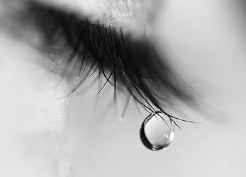February 16th, 2011 by Glenn Laffel, M.D., Ph.D. in Better Health Network, Research
1 Comment »

 Humans are the only living things that cry when they are overcome with emotion. Why do we do this?
Humans are the only living things that cry when they are overcome with emotion. Why do we do this?
A study by Noam Sobel and colleagues at the Weizmann Institute provide part of the answer, at least as it relates to women. The scientists showed that when men get a whiff of women’s tears, they experience a temporary, generalized loss of libido and a dip in testosterone. Really. (And you thought that red, runny nose was the turn off, didn’t you?)
Scientists have known for decades that the chemical composition of “emotional tears” differs from tears shed due to simple irritation. But now, it appears that some of the chemicals contained in the former are actually pheromones; biological substances that create behavioral changes in others who are exposed to them. Such chemicals were known to exist in urine in anogenital gland secretions (dont ask), but not in tears.
Sobel’s team began its study by posting ads on Israeli college campus bulletin boards in which they sought volunteers who cried easily. Seventy-one people responded. All but one were women. From that group, the scientists identified six who were profuse criers and who could return to their labs every other day.
The scientists then asked each one to select a movie that was guaranteed to make them break down, to watch it in private, and to collect their tears in a vial. For the controls, Sobel’s group trickled a saline solution down the same women’s cheeks and collected that. Sobel’s group subsequently asked male volunteers to sniff the contents of the two vials and ran a battery of psychological and physiological tests to measure their responses. Read more »
*This blog post was originally published at Pizaazz*
February 13th, 2011 by AnnMacDonald in Better Health Network, Health Tips
1 Comment »

 This is the time of year when stores are filled with red hearts and other reminders that Valentine’s Day is approaching. It’s a mood booster, not to mention a nice break from all that winter grey (at least up here in Boston). After all, what would life be like without romance, love — and sex?
This is the time of year when stores are filled with red hearts and other reminders that Valentine’s Day is approaching. It’s a mood booster, not to mention a nice break from all that winter grey (at least up here in Boston). After all, what would life be like without romance, love — and sex?
Unfortunately, a variety of health problems — as well as some of the treatments for them — can get in the way of sexual desire and functioning. Here’s a quick look at some of the main sources of trouble and suggestions about what to try first. If these initial strategies don’t work, have a heart to heart with your doctor about what to do next. There may not be a quick fix for health-related sexual problems, but there are steps you can take to help ensure that you can still enjoy a love life while taking care of the rest of your health.
Arthritis
Arthritis comes in many guises, but most forms of this disease cause joints to become stiff and painful. The limitations on movement can interfere with sexual intimacy — especially in people with arthritis of the knees, hips, or spine.
One common solution is to try different positions to find a way to make sex physically more comfortable. Another option is to take a painkiller or a warm shower before sex to ease muscle pain and joint stiffness. Or try a waterbed — which will move with you.
You can read more online by viewing this helpful article posted by the American College of Rheumatology.
Cancer
Cancer treatment may have long-term impact on sexual desire and functioning. Surgery or radiation in the pelvic region, for example, can damage nerves, leading to loss of sensation and inability to have an orgasm in women and erectile dysfunction in men. Chemotherapy can lower sex drive in both men and women. Read more »
*This blog post was originally published at Harvard Health Blog*
 Humans are the only living things that cry when they are overcome with emotion. Why do we do this?
Humans are the only living things that cry when they are overcome with emotion. Why do we do this?












